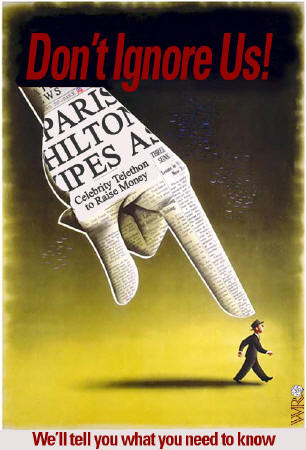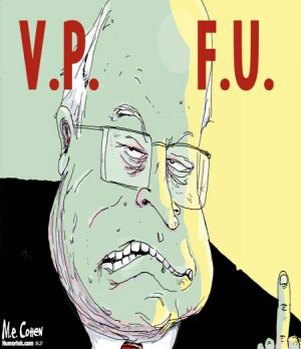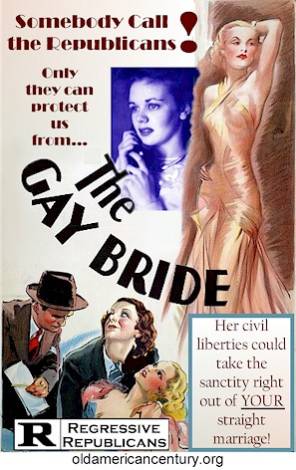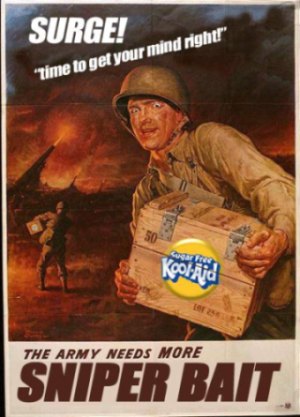
June 30, 2007
Maureen Dowd: Tears on My Pillow

Maureen Dowd, The New York Times, July 1, 2007
“I miss Albania!” W. wails. “They know how to treat a president there. Women were kissing me and men rubbed my hair. The crowd kept yelling, ‘Bushie!,’ and they almost grabbed the watch right off my wrist trying to get at me.”
The concerned group huddling outside the president’s closed-bedroom door in Kennebunkport can barely hear him. His voice is muffled because he has his face buried in his feather pillow, which the Secret Service has carefully transported from Washington to Maine for the weekend, knowing that it would be needed. They guard it so conscientiously that they have even given it a code name. Since the president’s Secret Service name is Tumbler, his agents christened his beloved pillow Slumber.
“Son, I know how you feel,” Poppy calls in to him, trying to sound positive. “Riding high in 2002, shot down in 2007. That’s life, as Sinatra says. You were a puppet and a pawn to King Dick and it screwed up your presidency and our party and the Middle East and the Atlantic alliance and the family legacy and Jeb’s future, not to mention the fate of the planet. But you can’t just roll yourself up in a big ball and die, George. Your friend Vlad the Impaler is here, and I think you should come out and talk to him. You invited him and he came all the way from Russia, and you don’t want to be rude.
“I’ve already taken him to Mabel’s Lobster Claw and out on the boat. He scared all the fish away. I don’t know what else to do with him, George. He brained the Filipino manservant, the little brown one, with a horseshoe.”
Frank Rich: When the Vice President Does It, That Means It’s Not Illegal

Frank Rich, The New York Times, July 1, 2007
Who knew that mocking the Constitution could be nearly as funny as shooting a hunting buddy in the face? Among other comic dividends, Dick Cheney’s legal theory that the vice president is not part of the executive branch yielded a priceless weeklong series on “The Daily Show” and an online “Doonesbury Poll,” conducted at Slate, to name Mr. Cheney’s indeterminate branch of government.
The ridicule was so widespread that finally even this White House had to blink. By midweek, it had abandoned that particularly ludicrous argument, if not its spurious larger claim that Mr. Cheney gets a free pass to ignore rules regulating federal officials’ handling of government secrets.
That retreat might allow us to mark the end of this installment of the Bush-Cheney Follies but for one nagging problem: Not for the first time in the history of this administration — or the hundredth — has the real story been lost amid the Washington kerfuffle. Once the laughter subsides and you look deeper into the narrative leading up to the punch line, you can unearth a buried White House plot that is more damning than the official scandal. This plot once again snakes back to the sinister origins of the Iraq war, to the Valerie Wilson leak case and to the press failures that enabled the administration to abuse truth and the law for too long.
One journalist who hasn’t failed is Mark Silva of The Chicago Tribune. He first reported more than a year ago, in May 2006, the essentials of the “news” at the heart of the recent Cheney ruckus. Mr. Silva found that the vice president was not filing required reports on his office’s use of classified documents because he asserted that his role in the legislative branch, as president of the Senate, gave him an exemption.
Liberals, Thank You. Grimmy
Dear Liberals,
I want to thank those of you who pushed to kill the amnesty bill.
George Bush (who I voted for twice) and his little friends, including Ted Kennedy, John McCain, and Dianne Feinstein, want open borders. They want dirt cheap labor, a dependent subclass, and ignorant voters, no matter the cost to you and me.
They are wrong, ugly wrong.
Perhaps senators in favor of this amnesty bill hadn’t taken the time away from their cocktails to look through it.
No excuse.
You did the right thing rather than the politically correct thing.
The architects of this bill, including the aforementioned, have proved themselves to be dishonest in trying to push it through the Senate before people could become aware of it. They don’t have your interests at heart.
Thank God for the internet and talk radio. Without these they could have succeeded.
But instead you were there. You joined the conservatives and this sneak attack on our national sovereignty (which consists of language, borders, and culture) failed miserably.
Without you this would not have happened.
Please accept my sincere gratitude.
Grimgold
Brainless Bong Hits Decision
The right-side of the Supreme Court decided against the First Amendment recently in the Morse v. Frederick [06-278] case. I’m not a lawyer of course, but I do still possess common sense – something the black-robed boys don’t.
Tony Hendra: Supreme Court Renames Self, Resegregates

Tony Hendra, The Huffington Post, June 30, 2007
There was a party atmosphere at the end of the Supreme Court’s session yesterday. A jubilant rightwing majority, represented by Justice Alito, made three dramatic announcements concerning the future makeup and direction of the court:
A. Effective immediately the Supreme Court will be renamed the Supremacist Court of the United States. The vote to rename was 5-4.
B. The first obligation of the Supremacist Court declared Justice Alito was resegregation. A colorblind Court should never elevate jurists to its bench simply by reason of their color. Since Justice Thomas had undeniably been nominated by George Bush Sr. because of his race: A. to fill the seat vacated by Thurgood Marshall and B. to dare the Democrats to reject him after their rejection of Robert Bork, he should be removed forthwith from the bench.
Justice Thomas fully concurred citing ‘extensive and incontrovertible evidence’ that the Framers’ ‘original intent’ had been an all-white all-male Court. “The idea that a black man can sit on this bench purely by virtue of his race is beyond outrageous – it is laughable. Imagine the Framers’ condoning such an absurdity…” He went on to entertain the court with an impersonation of an 18th century African-American “perhaps one of my own slave ancestors from Georgia” sitting beside Chief Justice John Jay at the Court’s opening session in 1790.
June 29, 2007
Paul Krugman: The Murdoch Factor

Paul Krugman, The New York Times, June 29, 2007
In October 2003, the nonpartisan Program on International Policy Attitudes published a study titled “Misperceptions, the media and the Iraq war.” It found that 60 percent of Americans believed at least one of the following: clear evidence had been found of links between Iraq and Al Qaeda; W.M.D. had been found in Iraq; world public opinion favored the U.S. going to war with Iraq.
The prevalence of these misperceptions, however, depended crucially on where people got their news. Only 23 percent of those who got their information mainly from PBS or NPR believed any of these untrue things, but the number was 80 percent among those relying primarily on Fox News. In particular, two-thirds of Fox devotees believed that the U.S. had “found clear evidence in Iraq that Saddam Hussein was working closely with the Al Qaeda terrorist organization.”
So, does anyone think it’s O.K. if Rupert Murdoch’s News Corporation, which owns Fox News, buys The Wall Street Journal?
The problem with Mr. Murdoch isn’t that he’s a right-wing ideologue. If that were all he was, he’d be much less dangerous. What he is, rather, is an opportunist who exploits a rule-free media environment – one created, in part, by conservative political power – by slanting news coverage to favor whoever he thinks will serve his business interests.
In the United States, that strategy has mainly meant blatant bias in favor of the Bush administration and the Republican Party – but last year Mr. Murdoch covered his bases by hosting a fund-raiser for Hillary Clinton’s Senate re-election campaign.
In Britain, Mr. Murdoch endorsed Tony Blair in 1997 and gave his government favorable coverage, “ensuring,” reports The New York Times, “that the new government would allow him to keep intact his British holdings.”
And in China, Mr. Murdoch’s organizations have taken care not to offend the dictatorship.
Ye Olde Scribe Presents: Mitt and Junior’s BIG, STUPID Adventure
Mitt had come into DC for a campaign when Junior, drunk as usual, drove up to him as he stepped out of his limo.
“Hic! Mitsy! Wanna go cruisin?”
“Well, of course, Junior. Can I bring my Irish Setter; the one who replaced Shameus II, who replaced Shameus I: Shameonme?”
“Why Shhhuuuurrrreee, Mitsy. Just tie em to da roofsy in his CURrier…”
“Thanks, your hinneyness. That’s a family tradition, you know. Ever since Shameus I covered our car on the way to Ontario from Boston with his ‘presents.’”
“Goody, he cun keep Barney cumpany. He’s up dere too.”
Door slam. Tires rub rubber all over the road, leaving a lot behind…
The two had a pleasant conversation, despite the horrible howls of protest from the roof. Junior took out five soldiers while driving, serveral African Americans from New Orleans, left many children without fathers and mothers… but he did avoid a petri dish of dying embryonic cells on a table in a lab as he crashed through the building.
“Must be kuntcurned about da unborn,” Monkey-boy said with an evil grin. “See, see, Is respects life… wans Is thinks its puliticully cuntvenyunt!”
No one dared to get him off the road.
“Des knows I’ll eider anthrax dem, Swift Bloat dem or Wellstone dem,” Junior explained to Mitt.
“I like your style, Junior.”
“Wull I lurned it fum you, Mitsy. Yous my haro… whats with driving on the way to Ontarrhiho wid ya dog tied to da roof. Didn’t even stup to wipe of da poop!”
Meanwhile, on the roof, Barney and Shameonme were howling and slamming back and forth in their cages. A voice spoke…
“What the hell are you two bitching about? I’ve been stuck up here for seven years!”
Poor Uncle Sam.
June 28, 2007
Sidney Blumenthal: The Imperial Vice Presidency

Sidney Blumenthal, Salon, June 28, 2009
When Huey P. Long left the governorship of Louisiana in 1936 to become a U.S. senator, he filled the position with a childhood friend named Oscar Kelly Allen, known as O.K., who gave the OK to whatever the Kingfish wished. The story is still told, perhaps apocryphal, that one day a leaf wafted through an open window and landed on O.K.’s desk and, without hesitation, he signed it.
Two months after 9/11, on the day of the fall of Kabul, Afghanistan, Nov. 13, 2001, Vice President Dick Cheney appeared in the Oval Office with a four-page executive order designating terrorism suspects as enemy combatants to be held indefinitely, with no right to have their detention reviewed by any court except newly created military commissions, where they would not be permitted to learn the accusations or evidence against them, or be represented by counsel, or even know that their case had been heard and decided.
The secretary of state and the national security advisor were deliberately kept uninformed as the White House staff secretary prepared the order for signature. According to a four-part series published this week in the Washington Post on the extraordinary power of the vice president, “When it [the order] returned to the Oval Office, in a blue portfolio embossed with the presidential seal, Bush pulled a felt-tip pen from his pocket and signed without sitting down. Almost no one else had seen the text.” Colin Powell was stunned when he learned of the fait accompli. “What the hell just happened?” he asked. Condoleezza Rice was described as “incensed.” But neither of them, then or later, effectively challenged Cheney’s usurpation of executive authority. And, as can be gathered inferentially, Bush never bothered to ask Cheney about their opinions on the executive order or to call them; nor did he seem to care.
The Washington Post series, written by Barton Gellman and Jo Becker, is an acknowledgment, after more than six years, of the hardly secret scope of Cheney’s unprecedented influence. The articles provide fresh detail of his elaborate network within the federal government and how he pulls its strings. On principle, Cheney and his aides are hostile to regular lines of authority set up to enforce professional standards and a responsible chain of command. Having served as President Ford’s chief of staff, he understood intimately how control of the paper flow meant control of the decision making. In 1999, the Post reported, Cheney explained to a conference of presidential historians: “The process of moving paper in and out of the Oval Office, who gets involved in the meetings, who does the president listen to, who gets a chance to talk to him before he makes a decision, is absolutely critical.”
June 27, 2007
Are the Corporations Evil?
A few years ago I had occasion to converse with a Chief Accountant of Federal Express. I mentioned to the pleasant young man how a teacher in an accounting class told us about an associate who was angrily given a choice: cook the books to make his corporation look good, or be fired.
At just the suggestion of this dishonesty, the Federal Express officer was incensed. He’d heard this before and emphatically declared FedEx. paid its taxes and reported its earnings in an above board manner.
I believe him.
Maureen Dowd: W. Learns From Students

Maureen Dowd, The New York Times, June 27, 2007
WASHINGTON – A group of high school Presidential Scholars visiting the White House on Monday surprised President Bush by slipping him a handwritten letter pleading with him not to let America become known for torture and urging him to stick to the Geneva Conventions with terror detainees.
The president reassured the teenagers that the United States does not torture. Then the vice president unleashed a pack of large dogs on the kids, running them off the White House lawn, before he shut down the Presidential Scholars program and abolished high schools.
Since it’s rare that Mr. Bush ever sees groups that have not been prescreened to be nice to him, he made the mistake of opening the letter in front of the students and was surprised to learn that he has made many Americans ashamed by subverting values that the country has always held dear, like abiding by the Constitution and respecting human dignity.
Mari Oye from Wellesley, Mass., who is headed to Yale in the fall, handed W. the letter signed by 50 students as they posed for a group picture. She told John Roberts on CNN that her mother had been a Presidential Scholar back in 1968 and always regretted not saying something to Lyndon Johnson about the Vietnam War. She also said her grandparents were Japanese-Americans who were interned during World War II, so she has compassion for those “in a similar situation.”
“We asked him to remove the signing statement attached to the anti-torture bill, which would have allowed presidential power to make exemptions to the ban on torture,” she said. “I really feel strongly about this issue and also about the treatment of some Arab- and Muslim-Americans after Sept. 11th.”




